‘Day of Action’ starts quietly, peacefully at Berkeley
A statewide "day of action" for public education kicked off quietly Thursday morning at Berkeley, with small groups of protesters greeting students, staff and faculty at major campus entrances with chants and signs. Many Berkeley faculty canceled classes to participate in events in Sacramento, where the focus was on the state Legislature's long-term disinvestment in public higher education in California.
March 4, 2010
4:33 p.m.
To Sacramento and back
More than 200 Berkeley faculty members traveled to Sacramento for today’s rally on the steps of the state Capitol. Among them was Shannon Jackson, chair of Berkeley’s Department of Theater, Dance and Performance Studies, who called the Day of Action “a great day.” She and her Berkeley colleagues joined faculty counterparts from throughout California public higher education, as well students, staff members, union representatives and many other participants that Jackson said reflect a broad cross-section of the system. She said it was “inspiring to see us all together.”
“It’s going to make a difference,” added Wendy Brown, a professor of political science who spoke at the Sacramento rally. “Whenever UC makes a case for itself (alone), it doesn’t work.”
Brown gave “a wonderful talk — not so much about what the university does for the economic future of California, but about the importance of creating an informed, educated public that you need for a democracy,” said history professor Tom Laqueur, who rode the train to Sacramento with colleagues from the departments of history, anthropology and classics. (Read Brown’s speech.)
With a midterm to give to his students today, Lacqueur said he first offered his graduate student instructors the chance to go to Sacramento, but when they chose to stay on campus, he jumped at the chance to go. He said it was important to attend the rally “to create a community with my colleagues. You don’t want to feel that you’re facing this alone. You go to a demonstration as much to demonstrate to each other as to those in power.”
Law professor Chris Kutz, chair of Berkeley’s Academic Senate, traveled to the Capitol via bus from campus. He highlighted George Lakoff’s address to the crowd about Lakoff’s California Democracy Act. Lakoff, a cognitive scientist and professor of linguistics, is collecting signatures for a ballot initiative that would let the Legislature act on revenue and budget measures with a simple majority vote, instead of with the two-thirds approval now required under the California constitution.
Tyrone Hayes, professor of integrative biology, also took a bus to Sacramento that left the West Crescent this morning. He was in charge of giving safety training information to the student and faculty riders, telling them “what to do and not do” at the rally to make it a good experience. On the way home, after a long day that included students being “constructively vocal,” said Hayes, “I was asleep, and so were a lot of people.”
4:05 p.m.
Around UC: Calm reigns at some campuses, confrontation at others
As students, staff and faculty throughout the UC system took part in today’s “day of action,” the level and intensity of activity varied widely from campus to campus. At some, protests were escalating as the day progressed.
According to news reports, several hundred students at UC Davis were in a tense faceoff with police in riot gear, who used a pepper ball in an attempt to disperse the crowd near an entrance ramp to Interstate 80. A library at UC Irvine was reportedly briefly occupied by protesters, while at UCLA, protesters entered an administration building, demanding to see the chancellor.
Protesters barricaded the Santa Cruz campus early this morning. Due to concerns about safety, UCSC officials advised students, staff and faculty to stay away from the main campus for the rest of the day.
Protesters were said to be several hundred strong at UC San Diego. At Merced, the number was closer to a dozen.
1:25 p.m.
At least 1,000 rally at Bancroft and Telegraph; march to Oakland begins
As a carillon concert rang out from the Campanile, a crowd estimated at upwards of 1,000 protesters staged a festive noontime rally at the intersection of Bancroft Way and Telegraph Avenue, while observers took in the action from the steps of the student union or atop lampposts and boxes
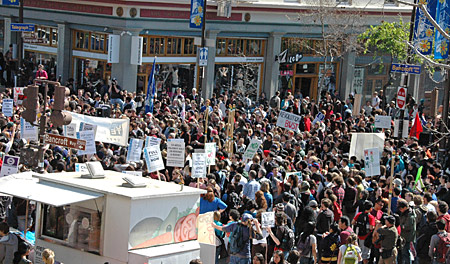
Protesters swamp the intersection at Bancroft and Telegraph for a noontime rally as the march to Oakland gets underway. (Jeffery Kahn/NewsCenter)
The protesters, massed in a huge circle, at one point opened up to allow several AC Transit buses and cars to pass through, then blocked the intersection again, causing police to divert traffic to the south. A pick-up truck parked in the intersection blared a dance soundtrack that included music by Lady Gaga, and the mellow crowd saw a dance performance and listened to speeches and spoken-word offerings over the truck’s speakers.
The rally ended after 40 minutes or so, as many in the crowd began a march to Frank Ogawa Plaza in Oakland. By the time they headed away from campus, enough protesters had joined in to fill four city blocks of Telegraph Avenue and the group stretched as far as the eye could see. Observers said there were far more people participating in the march than the 1,000 participants at the rally, and that the crowd might have nearly doubled for the walk to Oakland.
As the march approached Willard Middle School, youngsters greeted the protesters from school balconies and walkways. The marchers waived to the Willard students and cheered, and the middle schoolers did the same. One of the marchers, a UC Berkeley student named Carlos Freire, yelled to them, “This is for you! This is for you!”
As the march crossed Ashby, participant Mario Zelayan, a retired elementary school teacher from Berkeley and Oakland, gestured with a double peace sign. Involved decades ago in the Free Speech Movement as a UC Berkeley student, Zelayan said Thursday’s march is “great to see. I like justice.” When asked if today’s protest activities are as effective as those during the Free Speech Movement, he said, “You gotta do what you can do. Just sitting down and being quiet doesn’t bring about change.”
12:58 p.m.
Classes mostly calm, with scattered disruptions
Deans and department chairs report that many classes are taking place today as scheduled, and that some were relocated or are being taught via the Internet. They added that faculty who went to Sacramento Thursday made alternate arrangements with their students in advance. Some exams and classes were rescheduled to avoid possible disruptions. Some classes that did go forward had to make new plans at the last minute when fire alarms were pulled, disrupting classroom activity.
One dean reported that he was not aware of any class cancellations at his school, while another dean said only one-third of the classes in her department were being held. Classroom attendance varied as well, according to deans and chairs.
“Things seem to be very quiet in my division,” reported another dean. “I thought it was a good sign that I had a hard time finding a parking place this morning.”
11:55 a.m.
Picketing expands, on and around campus
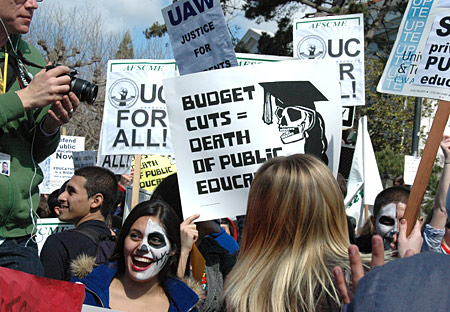
Protesters, some wearing Day of the Dead-style facepaint, flooded the intersection at Bancroft and Telegraph in advance of a planned march to downtown Oakland. (Jeffery Kahn/NewsCenter photos)
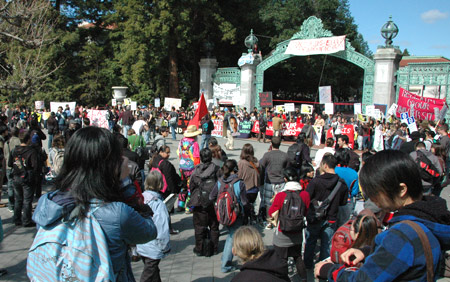
With the noon hour approaching, the crowd of pickets and passersby was growing at Sather Gate, where protesters hoisted banners spelling out their demands.
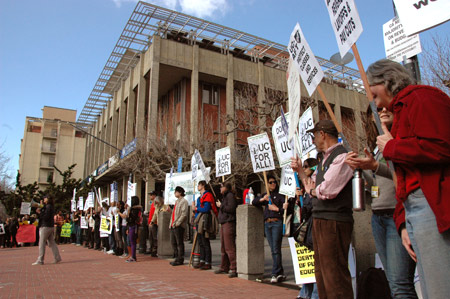
At the other end of Sproul Plaza, a picket line largely manned by members of UC Berkeley unions covered the entrance to campus at Bancroft and Telegraph. Hundreds of protesters spread out into the street, blocking the intersection as they chanted and danced.
11:13 a.m.
A teachable moment at Pimentel
Soon after 10 a.m., Sather Gate picketers began peeling off. Most headed west, drumming, chanting, and calling on students to come out of their classrooms and join them.
Inside Pimentel Hall, where physics professor Richard Muller was teaching “Physics for Future Presidents,” protesters interrupted and asked the amphitheater of about 75 students to leave the lecture and join them. Responded one student: “Don’t take away my rights, what I’ve paid for.” After a respectful back-and-forth, Muller politely told the protesters, “You’ve made your point, let’s go. We’re talking about the tsumani, Chile, and things world leaders need to know. Come join us.”
When protesters instead urged students to join the picket lines, Muller said, “I urge you to use this day to come to a class you might not ordinarily go to. Improve your education, improve yourself, you’ll be better world leaders. Sit down and join us.”
No one accepted the offer, and no students left the class.
10:05 a.m.
Bound for Sacramento (and irked in Berkeley)
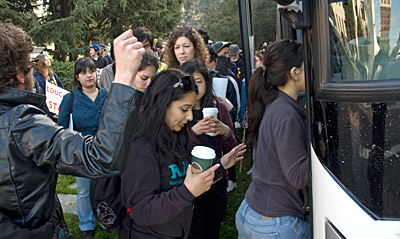
Stocked with protest signs and caffeine for their early-morning trip, art history students pile aboard a Sacramento-bound bus at the West Crescent. (Cathy Cockrell/NewsCenter)
A dozen or more buses carrying an estimated 300 people have taken off from West Crescent for Sacramento. Students and faculty members carrying backpacks and sipping coffee had waited patiently to board and talked about why they were making the trip today. “I ran out of other alternatives to get the word out,” explained Richard Norgaard, a professor in the Energy and Resources Group.
“I think it’s a bigger statement to go to the state capital with my professors than to stay here on the campus,” said Sabrina Hamm, a third-year undergraduate in Peace and Conflict Studies. “I’m paying for my own college, I’m from a low-income family. The increasing fees are affecting me a lot.” If you want change, added Hamm, you have to help make it.
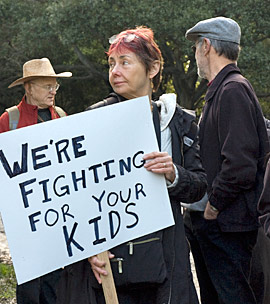
Anthropology professor Nancy Scheper-Hughes was one of many Berkeley academics headed to Sacramento for rallies at the state capitol. (Cathy Cockrell/NewsCenter)
Meanwhile, about 150 protesters – at times chanting “Money for jobs and education, not for war and incarceration” – continue to block Sather Gate, although people with disabilities were being allowed to pass through. Protesters also have begun blocking pathways closest to the gate, using red “danger” tape tied to lampposts and urns. A big banner at Sather Gate reads: “Put the $ where our minds are.”
Sophomore Julia Millon, who was leaving Dwinelle Hall after attending a math class, said it was frustrating to walk around the Sather Gate scene. “I’m not sure this type of protest is going to get us anywhere,” she said. “I think yelling at Sather Gate is not going to make people who can do something about it care.” Letter-writing to those in power, she suggested, was a better idea.
Added her classmate, Katelyn Sills, who also had to walk around the protest: “I missed my quiz and I’m a little angry about it.”
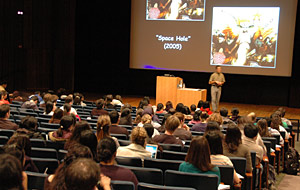
While some of their peers were on picket lines or protest buses, other students were in class, like this Neuroscience 101 lecture in Wheeler Hall. (Jeffery Kahn/NewsCenter)
Another student said she found a way to fit both class and protesting into her day’s schedule: Her only class today was at 8 a.m., after which she planned to join the crowd.
A small group of union workers at Center Street and Shattuck Avenue carried signs, leaflets and megaphones. Among them was John Franklin, a lab assistant at the campus insectary/greenhouse who has worked at UC Berkeley for 22 years. His daughter is a freshman at Sonoma State University, and he carried both an UPTE sign and a handmade placard reading: Pissed Off Parent.
“My daughter went to Berkeley High School,” Franklin said. “Even before high school, teachers were getting pink slips. The public school system needs to be supported, funded better.”
9:00 a.m.
‘Day of Action’ starts quietly, peacefully at Berkeley
A statewide “day of action” for public education kicked off quietly this morning at Berkeley, with small groups of protesters greeting students, staff and faculty at major campus entrances with chants and signs. By 8:30 a.m., more than 60 picketers were sitting in front of Sather Gate, registering a silent protest against funding cuts to higher education.
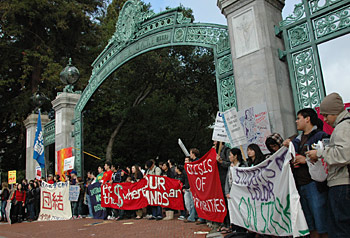
By 8:45 a.m. Thursday, scores of protesters were blocking Sather Gate with banners and bodies, allowing only the disabled to pass through. (Jeffery Kahn/NewsCenter)
With much of the focus on the state Legislature’s long-term disinvestment in public higher education in California, it appears a significant number of Berkeley faculty have canceled their normal class sessions to participate in events in Sacramento, making alternative arrangements with students to ensure the curriculum is covered.
By 9 a.m., the student group at Sather Gate had swelled to about 100 people, some of them chanting and drumming. At the West Crescent, hundreds of students and faculty were boarding buses headed for Sacramento. Many students waiting for rides had signs in tow. One protester elsewhere on campus carried a sign with the message: Everything for everyone.
8:15 a.m.
Governor addresses statewide education protests
In a Wednesday afternoon meeting with state education leaders, including UC Berkeley Chancellor Robert Birgeneau, Governor Arnold Schwarzenegger called for the establishment of a stable, long-term funding solution for education in California. Schwarzenegger said he understood and supported students who are planning Thursday’s Day of Action to Defend Public Education, and trusted they would “let their voices be heard and do it within the law.” ![]() Watch the video
Watch the video